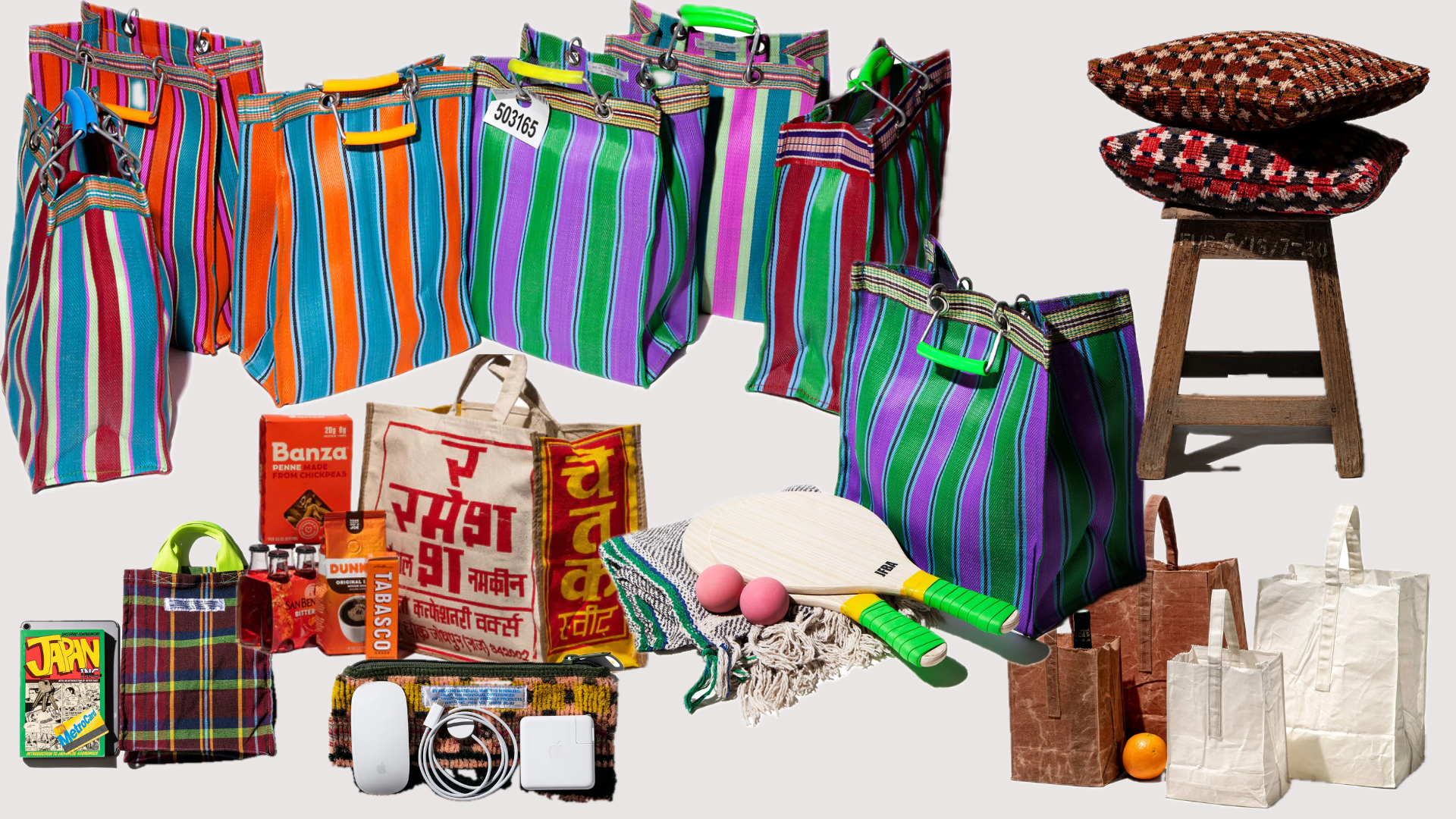
At first glance, Puebco truck tarp bags seem like the perfect blend of sustainability and style — rugged totes made from recycled Indian highway tarps, proudly marketed as vintage minimalism. They’re rough, industrial, and designed for the global consumer who loves objects with “a story.” But when those stories are stripped of context — when a survival fabric becomes a design object with no mention of the lives it once sheltered — the line between upcycling and erasure becomes uncomfortably clear.
Their aesthetic? Recycled industrial grit. Repurposed materials. Faded canvas. Military surplus. Scratched steel. It’s as if your granddad’s garage got an MFA in design.
But there’s one line in their catalog that keeps resurfacing — not just in stores, but in my mind — and I can’t look at it the same anymore: the truck fabric bags made from old Indian tarpaulin.
They’re patchy, worn, obviously lived-in. The colors are sun-bleached, the stitching uneven, the labels proudly say “Made from used truck fabric sourced in India.” To a certain eye — mine, a few years ago — they’re edgy and sustainable. Real.
But now I’m asking: Real at whose expense?



Let’s Be Honest: These Were Never Meant to Be Tote Bags
In India, truck tarps are survival gear. They’re not trend pieces. They’re the difference between cargo being protected or destroyed by the monsoon. Sometimes they double as makeshift shelter for drivers who sleep on highways because transport jobs don’t come with hotels. These tarps carry stories of labor, endurance, and exhaustion.
Now they’re turned into minimalist shoulder bags sold in boutique shops for $60 or more, neatly packaged under the umbrella of sustainability. It’s design. It’s global. It’s… edgy.
But it also feels a bit like poverty turned into a Pinterest board.
Whose Story Is Being Told Here?
Puebco says almost nothing about the people behind the materials. No context. No faces. No acknowledgment of the working conditions where these fabrics come from or the lives that wore them down in the first place.
It’s not that I want a sob story in every product description. But when you’re literally selling someone else’s hardship as a vibe, the silence feels deafening.
It’s the kind of quiet that lets people romanticize “grit” without understanding the grit they’re wearing.

The Ethics of Cool
To be fair, I don’t think Puebco is out to exploit anyone. I genuinely believe the brand values reuse and cares about design longevity. Their use of salvaged materials is, on paper, a good thing.
But that doesn’t make it immune to critique.
There’s a fine line between upcycling and extraction. Between respecting an object’s history and stripping it of context for aesthetic gain. Between honoring global materials and just making them look cool for people who will never know what they originally meant.
And when your products are sourced from the Global South, sold in the Global North, and marketed in neutral, design-forward language like “unique vintage fabric” without a whisper of where, how, or by whom they were made — it starts to feel like something’s being erased.
So… Is It Still Cool?
Here’s the dilemma: I still like the way the bag looks. I do. I love the rawness, the awkward English on the label, the feeling that it’s lived another life before it got to me. But I can’t unsee the disconnect between that life and the one it’s living now — slung over the shoulder of someone who’s never slept under a tarp in a thunderstorm.


Coolness, when unexamined, ages badly. It becomes costume. Or worse, cosplay.
What’s the Way Forward?
This isn’t about “canceling” Puebco. It’s about asking better questions. Who made this? Were they paid fairly? What did this object mean before it got rebranded as a design piece?
And maybe — just maybe — if we’re buying something that carries the weight of someone else’s labor, we owe it a little more curiosity. A little more care. A little more honesty.
Until then, I’ll be looking at that truck tarp bag with different eyes.
Not because it’s ugly — but because it tells a story no one seems willing to say out loud.